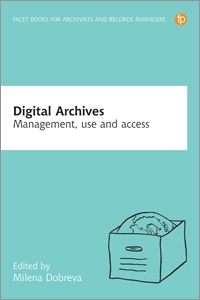
Primary tabs
You don't need to be an ALA Member to purchase from the ALA Store, but you'll be asked to create an online account/profile during the checkout to proceed. This Web Account is for both Members and non-Members. Note that your ALA Member discount will be applied at the final step of the checkout process.
If you are Tax-Exempt, please verify that your account is currently set up as exempt before placing your order, as our new fulfillment center will need current documentation. Learn how to verify here.
- Description
- Table of Contents
- About the author
- Reviews
Foreword by Professor Kalpana Shankar, Head of School of Information & Communication Studies, University College Dublin
This collection presents an expansive look at how rapid technological changes and the push for providing wide access to digitized cultural heritage holdings are changing the field. It offers up a set of inspirational and informative chapters from international experts that will help readers understand the drivers for change in archives and their implications. Among the topics explored are
- cultural institutions that are experimenting with sustainable business models for cultural production;
- the digitization of analog cultural heritage;
- intellectual property rights issues surrounding the re-use of digital objects and data for research, education, advocacy, and art;
- state-of-the-art solutions for building digital archives on networked infrastructure;
- trusted digital repositories for ensuring long-term access; and
- tools to serve emerging needs in digital humanities.
Foreword - Kalpana Shankar Preface - Milena Dobreva Part I – Drivers for Modern Digital Archives 1. Are digital humanities redefining the relationship between historians and information professionals? Documentary mediations in the digital age - Enrico Natale 2. Managing turbulence - Trudy Huskamp Peterson 3. The political economy of digital cultural preservation - Guy Pessach 4. Legal issues surrounding digital archives - Olexandr Pastukhov 5. Scientific information policies in the European context - Carla Basili 6. Access to digital archives: studying users' expectations and behaviours - Pierluigi Feliciati Part II – Case Studies 7. Research data archives: Current data management and data audit practices - Elli Papadopoulou, Panayiota Polydoratou, Sotirios Sismanis and Donald Tabone 8. Access restrictions - Gillian Oliver 9. Participatory approaches in archives - Milena Dobreva and Edel Jennings
Milena Dobreva
Dr. Milena Dobreva is an Associate Professor at UCL Qatar where she is coordinating the MA in Library and Information Studies leading the introduction of four pathways in the program including a specialization on Archives, Records and Data Management. Previously she served as a Head of the Department of Library Information and Archive Sciences at the University of Malta spearheading the redesign and expansion of the departmental portfolio, and as the Founding Head of the first Digitization Center in Bulgaria where she was also a member on the Executive Board of the National Commission of UNESCO. Milena is a member of the editorial board of the IFLA Journal, and of the International Journal on Digital Libraries (IJDL) and is the co-editor of User Studies for Digital Library Development (Facet, 2012).
"Digital technologies create new opportunities for making archival resources available but also bring new challenges for the memory institutions to handle. To understand the underlying driving forces in this process and their consequences is crucial. The content of this book addresses all involved in digital culture and scientific heritage: professionals like archivists, librarians and museum curators, scholars in the humanities, students and – most important – policy makers."
- Borje Justrell, former Director, National Archives of Sweden
"This collection of writings about digital archives, mainly focusing on access, looks at a variety of objects of preservation along their lifecycle and from the perspective of different disciplines, institutions, roles and purposes. It takes the reader outside several boxes, but will let you step comfortably back into the one/s you identify as your own. A challenging book for challenging times, one you should read to question or confirm, to be surprised or recognize, to learn other ways of looking at things."
- Luciana Duranti, Professor of Archival Studies, The University of British Columbia


